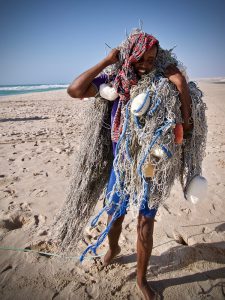It’s an uncommon site to see women in fishing boats at sea in Somalia, making a living by hauling in the region’s bountiful seafood. But in the coastal town of Eyl, one prominent fisherman is actually a fisherwoman.Asha Abdikarim stands on the sandy beach of Eyl among the town’s fishermen, dressed in a black robe and brown scarf. She is in her element, standing on the golden sand here: she has been fishing for nearly two decades.
Being in a traditionally male-dominated career has not stopped the 45-year-old from pursuing what she enjoys most – fishing, a career she began in 1999. Her knowledge and skills of the sea and passion for the art of fishing shine through as she talks about professional fundamentals such as the best times and locations to snare a good catch.
“During the monsoon season it is difficult working in the ocean. The boats can’t enter. The sea is furious and winds are very strong,” said Asha, a mother of three.
Somalia’s coastal areas see a six-month rotation between the low and high fishing season, which is determined by monsoon winds. In the low season, from May to September, high waves and strong winds pose a risk to small- and medium-size commercial boats. Artisanal fisheries are the most affected by the low season, leading them to perform limited trips to sea.
Eyl is an isolated coastal town that empties out during the low season, when many of the fishermen leave to find work elsewhere. Asha is one of the remaining fisher folk in the town, and she is looking forward to the upcoming fishing season in October.
Asha didn’t set out to be a fisherwoman in her younger years. She started out as a housewife, but then her marriage fell apart and she struggled to find a way to care for her three children.
Because her ex-husband had been a fisherman, she already knew how to store and prepare fish for the market. Those are skills she would put into practice after she built a hotel to cater to tourists who visit the historic town of Eyl.
“There was no guest house in this town before. People came only for one day and left before dusk. But now they have a decent place to rest where I cook fresh seafood delicacies for them,” she said.
The viability of Asha’s business got a boost when the International Committee of the Red Cross (ICRC) in July provided 20 solar-powered freezers and 20 boat engines to fishing families as a way to protect the mainstay livelihood of Eyl. Asha received one of each.
“I store the fish, lobster, and shark that I catch in the freezer and it keeps them from going bad,” she said.
The ICRC donated boat engines to three coastal communities in Somalia so that fishermen can stay out at sea longer. The freezers will allow the seafood to stay edible longer. The combination of the motors and freezes will allow the community to increase their catches and export more fish this upcoming season, Asha said.
“We are hopeful, inshallah. We will get our fortune. This sea is a blessing given by Allah.”




